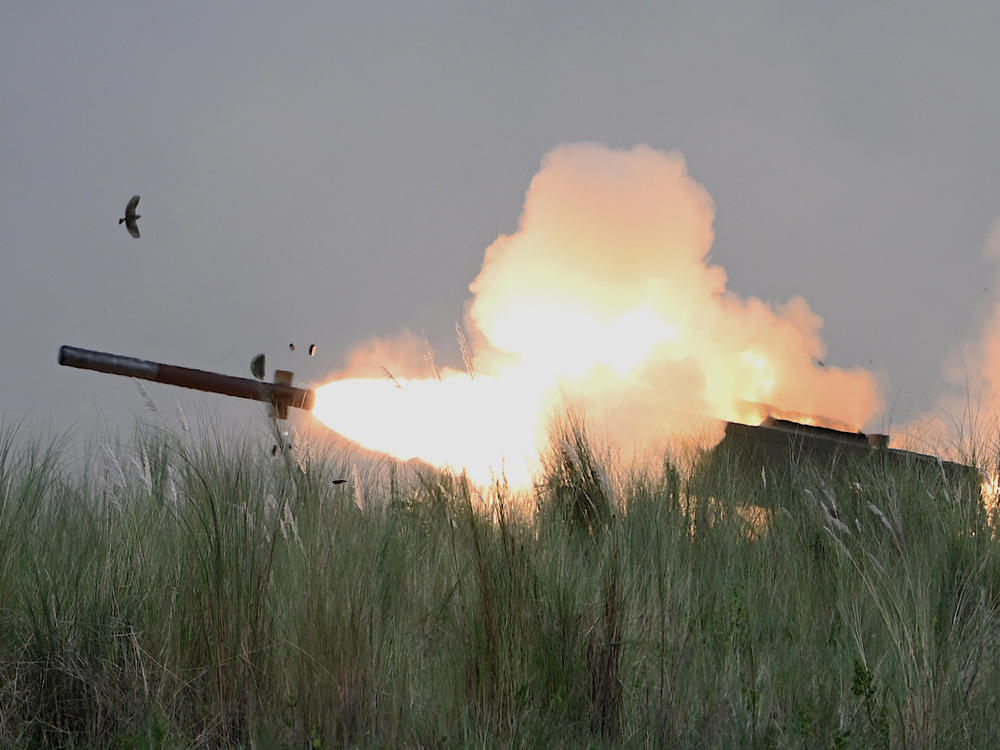Section Branding
Header Content
Russia says 63 soldiers were killed in a Ukrainian attack
Primary Content
Updated January 2, 2023 at 8:08 PM ET
Ukraine's military is taking credit for a blast that may have killed hundreds of Russian conscripts in Ukraine's far east in the first minutes of the new year. Russia's Defense Ministry corroborated the reports on Monday, but only claimed 63 deaths.
Officials in the so-called "Donetsk People's Republic," a part of Ukraine that Russia illegally annexed in September, expressed public outrage at the attack, placing blame on Moscow for grouping so many soldiers in one place.
Both sides say the strike took place in Makiivka, a suburb east of Donetsk, a major Ukrainian city that has been under Russian control since 2014, but the details of what exactly happened are murky. Western journalists are unable to enter the area, and therefore depend on both Russian and Ukrainian sources for information.
The attack potentially sets a record for Russian casualties in a single attack in the war so far.
Local social media channels in the Donetsk region reported massive explosions precisely at midnight on New Year's Day. By Sunday afternoon, videos of the destruction surfaced, including one that appeared to show dead bodies and a pile of rubble where a vocational school once stood. Internet sleuths soon geolocated and verified the videos.
"The school was a known Russian garrison, going as far back as 2014," Oleh Zhdanov, a top Ukrainian military analyst, tells NPR.
"[Since February], most Russian soldiers were scattered across the front, but when Ukraine noticed reservists bunching together in one place they took action," Zhdanov added.
On the evening of New Year's Day, Ukraine's Strategic Command posted a sarcastic note on its official Telegram channel about "Santa stuffing body bags with 400 corpses."
Russia makes a rare admission of battlefield losses
The news triggered rage among pro-Russian leaders in the breakaway region.
"I can't blame Ukraine. The real killer is the son-of-a-b**** who made our fighters into easy targets," posted Alexey Sukonkin, an influential blogger in Russian-occupied Ukraine.
Russia's state-run TASS news agency blamed soldiers' cellphone data for tipping off their barracks' location to the Ukrainians.
Igor Girkin, the former defense minister for the separatist Donetsk region, shared similar sentiments online, and claimed to have visited the attack site.
"The number of dead and wounded goes to many hundreds," he said.
Finally, on Monday, Russia's Defense Ministry issued a statement accusing Ukraine of using American-supplied HIMARS rockets to carry out the attack. The public statement made a rare admission of battlefield losses.
Ukraine's General Staff followed the Russian announcement by confirming the attack, though without specifying the suspected number of casualties or weapons used.
"It takes a long time to find out how many people die from an attack like this," said Zhdanov. "But we can have a general sense."
Attacks such as this will likely stoke unrest in Russia
The apparent attack on Makiivka came just days after Ukraine's defense minister, Oleksii Reznikov, encouraged draft-age Russian men to desert or protest against the war.
"As this war drags on, your personal chances of dying will increase," he said.
As Russian media began to report on the destruction, Russian citizens who claimed to have conscripted relatives stationed in Makiivka demanded to know if they were among the dead.
Military analyst Oleh Zhdanov says strikes like this will likely continue to stoke unrest within Russia, where anti-draft demonstrations took place last summer.
"Surely there will be another mobilization soon," says Zhdanov, "so the Russians are downplaying their losses because they're afraid of mass resistance."
Copyright 2023 NPR. To see more, visit https://www.npr.org.

